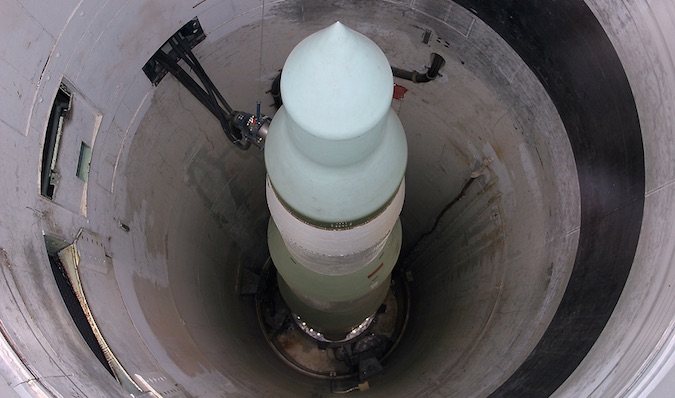
Former US and Russian commanders have urged their rival governments to scrap “hair-trigger” alerts on nuclear weapons to avoid a potential atomic disaster — especially in an age of cyber attacks.
Retired military officers from the United States, Russia and other nuclear powers issued a report on Thursday warning of the dangers of the short fuses that allow hundreds of atomic weapons to be launched within minutes.
The high alert status is a legacy of outdated Cold War doctrine, when US and Soviet leaders feared a devastating first strike that could “decapitate” an entire nuclear force, according to the report, sponsored by the disarmament group Global Zero.
“Hundreds of missiles carrying nearly 1,800 warheads are ready to fly at a moment’s notice,” said the report. “These legacy postures of the Cold War are anachronisms but they remain fully operational.”
The hair-trigger alert, which applies to half of the US and Russian arsenals, is particularly dangerous in an era when “warning and decision timelines are getting shorter, and consequently the potential for fateful human error in nuclear control systems is growing larger.”
The growing threat of cyber assault also exacerbates the risks of the alert status, opening the way for false alarms or even a hijacking of the control systems for the weapons, it said.
“Vulnerability to cyber attack… is a new wild card in the deck,” it said.
A digital strike could undermine the accuracy of early warning systems, and an anti-satellite weapon could knock out satellites used to detect incoming nuclear missiles.
The report calls for the presidents of the United States and Russia to renounce the prompt-alert arrangements and to require 24 to 72 hours before a nuclear weapon could be launched.
“The fixes would entail lengthening the current hasty timelines for launch decision-making and implementation of launch,” it said.
The panel also urges forging a binding agreement backed up by verification for all nuclear-armed countries to refrain from putting their atomic forces on high alert.
False alarms
“There are a set of vulnerabilities particularly for the US and Russia in these systems that were built in the fifties, sixties, seventies and eighties,” said James Cartwright, a retired four-star general who once oversaw the US nuclear arsenal.
“Many of these old systems are subject to false alarms,” Cartwright said at a news conference.
There have been numerous cases when US or Soviet officials believed their countries were under nuclear attack before realizing the warnings were incorrect, because of human or technical mistakes.
Perhaps the most serious incident occurred in 1979, when US national security adviser Zbigniew Brzezinski was “picking up the phone” to tell president Jimmy Carter that Soviet nuclear missiles were approaching US territory, said Bruce Blair, co-founder of Global Zero.
At the last moment, Brzezinski learned it was a false alarm, caused by a defective computer chip.
In 1983, a Soviet satellite detected five US intercontinental ballistic missiles heading toward the Soviet Union. A senior Russian officer was skeptical that Washington would only launch a handful of missiles and informed his superiors it was a false alarm.
His instincts were proven correct and it was later discovered that the early warning system had misinterpreted the reflection of the sun on clouds as a missile launch.
At no point, however, has a false alarm of a nuclear attack reached a national leader, he added.
The report said other nuclear powers, including China, India, Pakistan, Israel, France and Britain, have built less risky systems for their nuclear weapons compared to the United States and Russia.
“Their architectures have provided for lower alert rates and afforded decision-makers more time to consider their nuclear options,” it said. “The United States and Russia could learn from these models.”
The panel also urged an overhaul of nuclear strategy and doctrine particularly by the United States, Russia and China, arguing that much smaller nuclear forces could fulfill the goal of deterring adversaries.
The Cold War principle of “mutually assured destruction” requiring large nuclear stockpiles has become obsolete. Atomic bombs had little use against current security threats such as terror attacks or cyber warfare, it said.
The United States should aim for dropping the idea of a “triad” of nuclear bombers, submarines and land-based missiles. Instead, America could jettison the land-based ICBMs, which are more vulnerable to attack and costly to maintain, it said.














